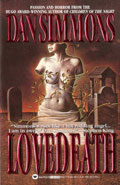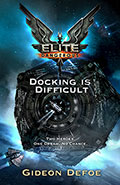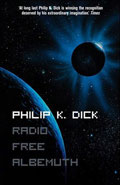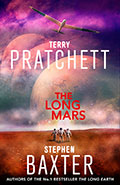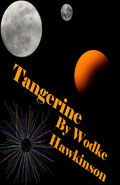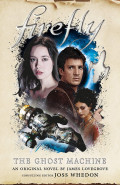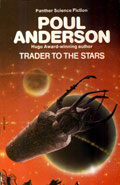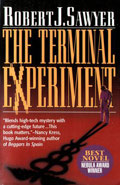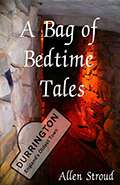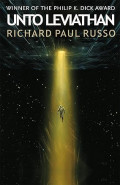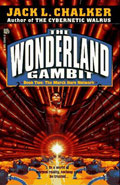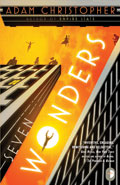Nebula award stories 8
By Isaac Asimov
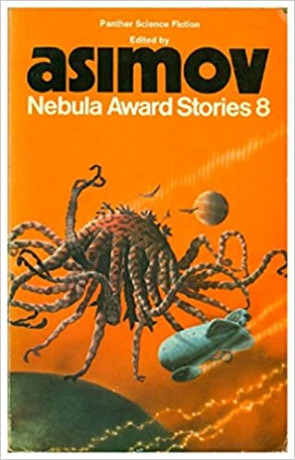
- Nebula award stories 8
-
Author: Isaac Asimov
-
Publisher: Panther
- ISBN: 978-9997376558
- Published: November 1973
- Pages:
- Format reviewed: Paperback
- Review date: 28/12/2022
- Language: English
This time last year, I finally got around to reading the 1973 annual world's best science fiction, which had some interesting stories, but were all written by male, American authors. Hardly world fiction at all, and even then not the best of the previous 12 months. Nebula award stories 8 seems more promising. It has to be said though that although this book was published in 1973, the stories themselves were largely written in 1972, and won the highest honours in the 1972 Nebula award competition, which was presented in April 1973.
Anyway, these are still the best science fiction stories I could find that were published in 1973 and are written by some of the leaders of the field at that time. It's also got an interesting introduction by Isaac Asimov, who writes about the growing popularity of the genre and how science fiction at the time was emerging into a much more sophisticated and mature market but that despite this, the writers are under-paid and that the genre was still often frowned upon and miss-understood. He notes that many factors still limited adoption into larger society, such as a general lack of understanding of the background material. For context up until this point the majority of science fiction had either been "pulp" stories, or "hard" science fiction, which provided such barrier to entry. Around this time however authors began to experiment with the genre, introducing concepts that had previously been restricted to mainstream fiction, such as sexuality, politics and postmodernism. Authors began to give their stories more style and soften those hard edges that prevented adoption to the genre.
It's an interesting snapshot of the period, and of the genre itself. Given how big science fiction media is in the 21st century, along with the way writers make an effort to provide a lower cost of entry (which lead some decry science fiction has become too "soft"), I don't think this barrier still exists, although the genre is still often unfairly frowned upon for being low brow.
A Meeting with Medusa by Arthur C. Clarke
A meeting with Medusa won the Nebula award for "Best Novella", beating the Fifth head of Cerberus (also featured in this collection) and The Word for World Is Forest, which is actually somewhat surprising given their calibre as either were equally deserving of the award.
It's a story that explores the limits of human exploration and understanding. It follows the character Howard Falcon, a space explorer who embarks on a mission to investigate the atmosphere of Jupiter in an experimental hydrogen-supported space craft called the Kon-Tiki (named after the 1947 journey across the Pacific Ocean by raft). Along the way, Falcon encounters a strange, alien life form known as the Medusa, which challenges his understanding of the universe and his own humanity.
One of the most striking aspects of this story is Clarke's use of vivid, descriptive language to bring the world of Jupiter and the Medusa to life. The descriptions of the gas giant's atmosphere and the alien creature are both vivid and unsettling, and they do an excellent job of immersing the reader in the story.
Another strength of the story is its ability to engage the reader's imagination. The concept of an alien life form that is both intelligent and entirely alien is a fascinating one, and Clarke does an excellent job of exploring the implications of such a creature. The ending of the story, in particular, is thought-provoking and leaves the reader with much to consider.
Shaffery among the Immortals by Frederik Pohl
The story follows Shaffery, a scientist struggling for greatness. Shaffery is desperate to be seen as an "immortal" figure who's names lives on forever. To share the fame of the scientific explorers such as Einstein, Copernicus, Gallileo or Kepler. His ambition far exceeds his grasp as he looks for that one thing that will make him memorable. The story is written with a great deal of humour and light-heartedness in a similar vein to Douglas Adams, while exploring the deep-seated ambition and longing that scientists might harbour.
Patron of the arts by William Rotsler
The short story Patron of the arts was published in 1972 and then expanded into a full length novel two years later. It tells the story of billionaire Brian Thorne, one of the eight richest people in the world. Brian has two passions in his life (other than his accumulation of wealth) women and art, and he sets out with a plan to combine the two. The end result is the sensatron, a strange device that seems to cause Brian to disappear.
It's an uncomfortable story which dehumanises women to the point that they are merely objects that exist to entertain the protagonist. Even back in the 1970's it must have raised a few eyebrows with such a portrayal. fifty years later it's just unreadable and I'm surprised it got made into a full novel. I'm surprised it was even considered for a Nebula, never mind being included in this collection.
When it changed by Joanna Russ
When It Changed, by Joanna Russ, was first published in 1972 and went on to win the Nebula award for "Best Short Story". The story is set on the planet Whileaway, a utopia in which all the inhabitants are women and there are no men. The women of Whileaway have created a technologically advanced, peaceful society, and they have no need or desire for men.
One day, a group of men from Earth arrive on Whileaway, and the women are confronted with the question of what to do with them. The men, who are from a less advanced society, are fascinated by the women's way of life and are eager to learn from them.
The women of Whileaway are divided on how to handle the men's presence. Some believe that the men should be allowed to stay and learn from the women, while others think that they should be sent back to Earth. The women debate the issue and ultimately decide to allow the men to stay, with the condition that they must adhere to the same rules and customs as the women.
When It Changed explores themes of gender and power dynamics, as well as the potential consequences of introducing outsiders into a society. It also touches on the idea of utopia and the challenges that can arise when attempting to create a perfect society.
On the downhill side by Harlan Ellison
Magic surrealism written by the mind of Harlan Ellison. Paul walks his Unicorn though the dark streets of New Orleans before meeting the ghost of Lizette, whom he loved too much and her too little. They wonder the streets, trying to come to terms with their actions before they both fade away.
I'm a big fan of Ellison's writing, he was an inspirational figure during the "new wave" of speculative fiction in the 1960's and 1970's and his mind conjured up such influential fiction as “I Have No Mouth, and I Must Scream”, "The City on the Edge of Forever" and of course Dangerous Visions.
On the downhill side is a bit disappointing, not up to Ellison's usual standards. It's more than a little surreal (which isn't a problem in itself) but the writing isn't good enough for the unusual approach to work. The protagonists are not at all like-able, the writing feels somewhat dated and the setting doesn't do New Orleans justice. It doesn't feel like a ghost story, just a bit of a miss-match of styles suffused in confusing surrealism.
The fifth head of Cerberus by Gene Wolfe
Before it was made into a full size novel, The fifth head of Cerberus was a novella length story published in this very book. It was short-listed for the Nebula award for "Best Novella", along with Ursula K Le Guin's The word for world is forest (which bears remarkable similarity to James Cameron's overgrown-smurf feature film Avatar) but lost out to Arthur C Clarke's A meeting with Medusa.
It's an amazing tale and personally one I would have chosen over Clarke's (although that too is pretty decent), written in the form of a biographical study of the narrator John V. Marsch, who, from his location on the planet Saint Anne, looks at the events that lead to his incarceration (and eventual freedom), specifically his youth on twin planet Sainte Croix.
One of the key themes of the novella is the idea of identity and self-discovery. John is constantly questioning who he is and where he belongs, as he tries to make sense of the strange and unfamiliar world of Saint Croix. The novella also touches on themes of colonialism, exploitation, and the power dynamics between different cultures and societies.
Overall, The fifth head of Cerberus is a thought-provoking and highly imaginative work of science fiction that explores complex ideas about identity, culture, and the nature of humanity. It is a must-read for fans of the genre and those interested in the works of Gene Wolfe.
When we went to see the end of the world by Robert Silverberg
I like Robert Silverberg's work, especially the Majipoor chronicles which manage that rarity of successfully combining elements of fantasy and science fiction. He's been a mainstay of the genre for over 60 years and this is another gem, being nominated for both the Nebula and the Hugo. It's since appeared in a number of collections and has been translated into languages including French, German, Italian, Dutch, and Russian.
As the title might suggest, when we went to see the end of the world is about witnesses travelling to such an event but then coming back to narrate their experience, which is done at a cocktail party of Nick and Jane's acquaintances. Such a journey is new and as a result an expensive and rare trip. Nick and Jane are elevated above their peers by the experience. That is until some more people turn up who also claim to have witnessed the event and who's recounting is entirely different to Nick and Janes. Then a third group turn up and describe different experiences to the first two groups.
I liked the social dynamic of this party where the guests are clearly trying to show they are better than others and the story is light-hearted and fun. There is also a reasonable idea suggested as to why each party had totally different experiences to the end of the world.
Goat Song by Poul Anderson
Originally appearing in the Magazine of Fantasy & Science Fiction, this little gem won the 1973 Hugo award and the 1972 Nebula award for best novelette while coming third for the Locus Poll Award, Best Short Story. This story also appears in the 1973 annual world's best science fiction collection.
Far in the future, man is governed by an advanced AI known as SUM. SUM is a bit of a smart-arse and claims to record and store a persons soul, allowing a form of reincarnation at a future date. So far though SUM has only used such technology to keep the eternal ruler, The Dark Queen, young. Meanwhile a Harper, who seems to be the only person left who remembers the old songs mourns for the loss of his beloved, wishing for her to be resurrected. It's a retelling of the Orpheus myth, but jam-packed with the usual clever ideas of Anderson's.
Written on 28th December 2022 by Ant .
